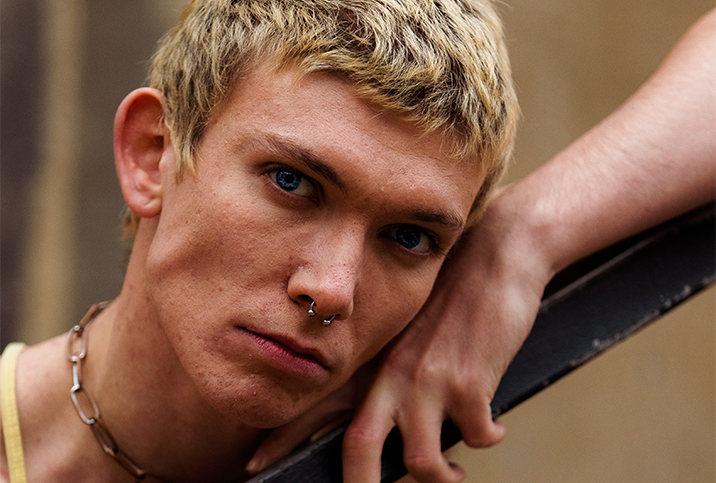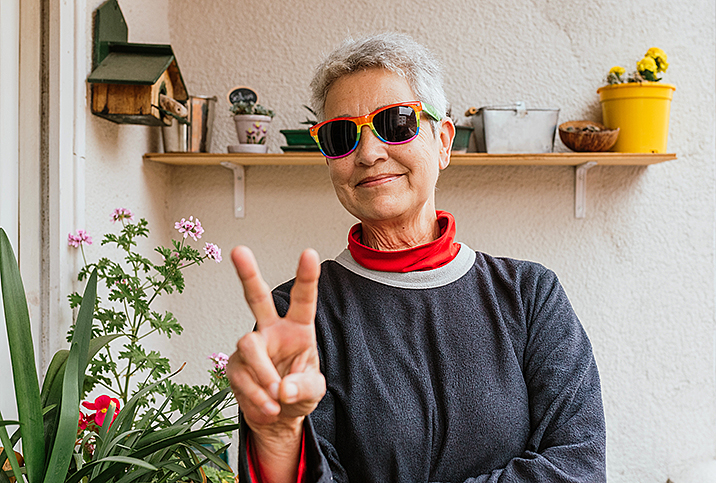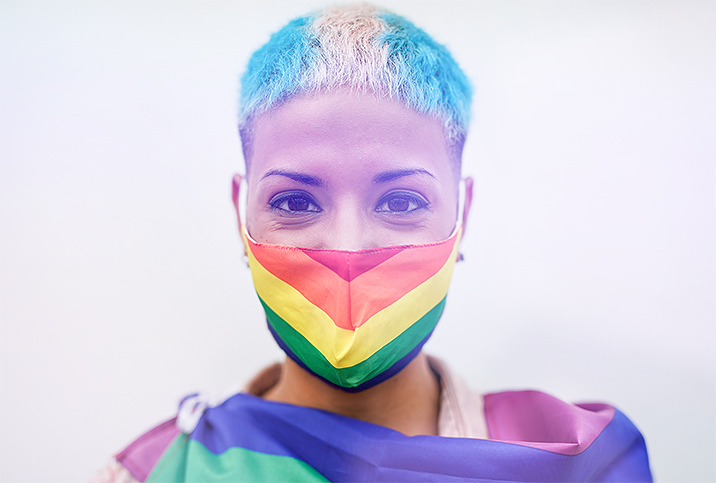Stop Worrying Whether You're 'Queer Enough'

While there's a lot of queer joy to be had—I will never stop talking about how cute Toni and Shelby are in "The Wilds," for example—there's a lot of discrimination to face, too. Coming out can prove incredibly taxing, especially if your loved ones don't support you. Accurate queer sex education is essentially nonexistent in schools. Body insecurities are a plague. And perhaps the most terrifying peril: LGBTQIA+ people are nearly four times more likely than other people to experience violence.
Those issues only scratch the surface.
Another struggle faced by some people in the LGBTQIA+ community is queer imposter syndrome (QIS), which is exactly what it sounds like. Defined by queer sex therapist Casey Tanner on Instagram, it's "the feeling of being undeserving or not 'queer enough' to identify under the LGBTQIA+ umbrella and/or take part in queer spaces." Let's talk about it.
Who might struggle with queer imposter syndrome?
Anyone can experience QIS, but it can feel stronger for people who have had certain experiences.
"I think most queer folks struggle with it at some point in the coming out process, but certainly for those who come out later in life and those with strongly internalized homo/bi/queerphobia, it tends to be more deeply ingrained," said Rebecca Minor, M.S.W., L.I.C.S.W., a LGBTQIA+ gender specialist, therapist, parent coach and adjunct professor in Boston.
This makes sense given the problems and messages out there, such as:
- Bisexual/biromantic people should just "pick a side." (Nope.)
- Both queer and straight cisgender people can be biphobic.
- Bi people "have" to be 50 percent interested in women and 50 percent interested in men. (In reality, there's no need to put a percentage to it, and that percentage can vary.)
- If you come out "too soon," you "don't know any better," but if you come out "too late," you "couldn't have been born that way" or "identified that way your whole life."
Getting these messages from loved ones, or anyone, can mess with your head.
"It simply would just be tough," said Tiffany Jones, M.S., L.P.C., regional clinic director at Thriveworks counseling and psychiatry in Fredericksburg, Virginia, and a member of the American Association of Sexuality Educators, Counselors and Therapists (AASECT). "People closest to you that hold your trust question every thought and decision you make about your body and mind through their own unconditioned, cisgendered heterosexual viewpoint, rather than seeing into the queer community from which your body, heart and general inner self are undeniably linked."
When LGBTQIA+ people have these internal thoughts and external experiences, they may then wonder if they're "queer enough" to be considered a part of the community.
"People report not wanting to take up space that doesn't belong to them, grappling with concerns about being in a hetero-passing relationship but being queer, the pull of compulsory heterosexuality, internal conflicts with societal expectations, and not having a queer relationship or sexual history and feeling like that disqualifies them from claiming queerness," Minor said.
Don't forget about the media we consume. Jones said some queer people may struggle with the constant stereotypes portrayed in TV shows, stories, pornography and more that claim to show what it's "really like" to be queer. What we see isn't always true, at least not for everyone.
Are you struggling with QIS?
You may know if you struggle with queer imposter syndrome. For example, a bisexual person in a hetero-presenting relationship may know their relationship doesn't negate their queerness, but worry about it or feel unseen anyway (and understandably so).
But other times, it can be easy to get caught up in those stereotypes and truly wonder who you are. To help you figure out if you're experiencing QIS, so you can address it and feel validated, Jones shared some signs to look for:
- You feel like an outsider or as though you don't belong with other queer people.
- Those thoughts cause a decrease in your self-worth.
- You consistently internalize similarities and differences between yourself and others.
- You feel confused about your identity and want to explore it more.
Additionally, Minor mentioned thinking, "I know I'm queer, but not queer enough to (fill in the blank)," and worrying the LGBTQIA+ community won't accept you.
"Doubt and confusion are a natural part of the identity development process and may take time to subside, but not feeling 'queer enough' doesn't mean you aren't queer," she said.
How to cope with not feeling 'queer enough'
Connecting with other LGBTQIA+ people is a great way to work on your queer imposter syndrome. It can show you that queerness looks different for different people; the community is not a monolith.
"Feeling seen in those spaces can be incredibly affirming," Minor said. "Making new connections can help because you are presenting yourself for the first time and won't be working against years of history pre-coming out."
She said virtual queer spaces, especially virtual support groups, are another way of connecting to consider. They can be validating, structured and a good option for people who are nervous about meeting in person.
Jones suggested gaining knowledge and getting professional support to work on the core beliefs behind your QIS thoughts.
"Talking through challenges and reconstructing core beliefs, especially regarding concepts of belongingness, will help pick out actual facts versus irrational thoughts," she explained.
She said you can jot down your thoughts or start a journal as a coping skill, or as a reminder of what to mention in therapy sessions so your therapist can identify patterns and suggest specific coping skills.
Jones recommended reminding yourself that your understanding of who you are can change, and to both validate and celebrate this fact. For example, it's OK if your sexual orientation changes or you want to use "she" and "they" pronouns. It's important to praise yourself for where you're at now and as you discover more about yourself.
Throughout the entire process, Minor encouraged you to repeat mantras to yourself, such as "I am queer enough" or "My queerness is powerful/magical/true."



















Commentary